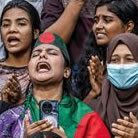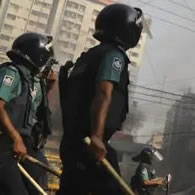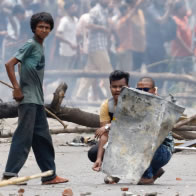Fleeing Violence In Bangladesh
- David Burgess
- 22 hours ago
- 10 min read
In recent times, Bangladesh has been gripped by a surge in violence that has left many, especially minorities, in dire straits. The situation has driven thousands to seek refuge across borders, particularly in neighboring India. Understanding the dynamics of this crisis is crucial for raising awareness and advocating for human rights.
Article-at-a-Glance
Violence in Bangladesh has escalated, targeting minority groups, particularly Hindus.
Many refugees face significant challenges, including crossing borders and finding safe havens.
Local authorities have struggled to maintain order and provide adequate protection for vulnerable communities.
International organizations are stepping in to provide aid and call for diplomatic solutions.
Individuals can help by raising awareness and supporting humanitarian efforts.
Recent Escalation of Violence in Bangladesh
The recent violence in Bangladesh can be traced back to a complex web of political and social issues. Ethnic tensions have been simmering for years, often flaring up during times of political transition. The current crisis was exacerbated by the resignation of Prime Minister Sheikh Hasina, which left a power vacuum and heightened instability.

"HE Sheikh Hasina | Champions of the Earth" from www.unep.org
Lotus Ministry Remains In Bangladesh For Food Relief
Current Events Leading to the Crisis
With the departure of Sheikh Hasina, the country has been in a state of political limbo. This uncertainty has emboldened groups that harbor anti-minority sentiments, leading to attacks on communities perceived as allies of the former regime. The Hindu minority, in particular, has been targeted due to their perceived support for Hasina.
Media reports have highlighted the violence, with some outlets exaggerating the scale of attacks. This has further fueled tensions, as misinformation spreads fear and distrust. For instance, some reports have claimed widespread destruction of Hindu homes and temples, which has led to panic among the community. For more details, see how Hindus in Bangladesh try to flee to India amid the ongoing violence.
"In Bangladesh, attacks on minority groups have become common when transition in power occurs." - Asia Pacific
Historical Context of Ethnic Tensions
To fully understand the current situation, it's important to look at the historical context. Bangladesh has a long history of ethnic and religious tensions, often tied to its political landscape. During times of political upheaval, these tensions tend to surface, resulting in violence against minority groups.
In the past, changes in government have often led to periods of unrest, with minority communities bearing the brunt of the violence. This pattern of instability has left many feeling vulnerable and without protection from the state.
Major Incidents and Affected Areas
Recent reports indicate that several areas in Bangladesh have been particularly affected by the violence. For example, in the Thakurgaon district, around 700-800 Hindus attempted to flee to India after their homes were attacked and looted. Such incidents highlight the severity of the situation and the urgent need for intervention.
These attacks are not isolated. They form part of a broader pattern of violence that has spread across various regions, leaving many communities in fear for their lives. The impact of these incidents is profound, displacing families and disrupting lives.
Actions Taken by Local Authorities
In response to the escalating violence, local authorities have attempted to restore order. Security forces have been deployed to affected areas, and measures have been taken to prevent further attacks. However, these efforts have been hampered by the scale of the violence and the limited resources available.
Local leaders have called for unity and social resistance against the violence. Moyna Talukdar of the Bangladesh Hindu Law Reform Council urged communities to stand by the affected people and build social resistance to the attacks.
Impact on Refugees and Displaced Persons
The violence in Bangladesh has forced many to flee their homes, seeking safety across borders. This mass displacement has created a humanitarian crisis, with refugees facing numerous challenges as they attempt to find refuge.
Immediate Challenges Faced by Refugees
Refugees fleeing the violence in Bangladesh face immediate challenges, including crossing borders safely and finding shelter. Many are met with resistance at the borders, complicating their escape to safety. Additionally, once they cross into neighboring countries, they often encounter difficulties in accessing basic necessities such as food, water, and medical care.
International Response and Humanitarian Aid
In response to the crisis in Bangladesh, the international community has been mobilizing resources to provide humanitarian aid and support. This global effort is critical in addressing the immediate needs of refugees and displaced persons who are struggling to survive amidst the chaos. Humanitarian organizations are working tirelessly to deliver food, shelter, and medical assistance to those affected by the violence.
Furthermore, international diplomatic channels are being utilized to pressure the Bangladeshi government to take decisive action in curbing the violence and protecting minority communities. These diplomatic efforts aim to foster dialogue and encourage peaceful resolutions to the ongoing conflict.
Efforts by Neighboring Countries to Assist Refugees

What's next for Bangladesh's divisive ..." from www.timeshighereducation.com
Students Protest The Violence In Bangladesh
Food Aid Is Being Provided By Lotus Ministry
Neighboring countries, particularly India, have been at the forefront of efforts to assist refugees fleeing the violence in Bangladesh. The Indian government has increased border security to manage the influx of refugees and ensure their safety. Additionally, temporary shelters and camps have been set up to accommodate those seeking asylum.
However, the situation remains challenging, as resources are stretched thin and the sheer number of refugees continues to grow. The Indian government is working in collaboration with local NGOs to provide essential services such as food distribution, healthcare, and legal assistance to refugees.
Besides that, other neighboring countries like Myanmar and Nepal are also playing a role in providing refuge to displaced persons. These countries, despite facing their own challenges, have shown solidarity with Bangladesh by opening their borders and offering assistance to those in need.
Global Humanitarian Organizations' Involvement
Global humanitarian organizations, including the United Nations High Commissioner for Refugees (UNHCR) and the International Red Cross, are actively involved in the crisis. These organizations are deploying teams on the ground to assess the situation and coordinate relief efforts. Their involvement is crucial in ensuring that aid reaches those who need it most.
In addition, these organizations are advocating for increased international support and funding to address the growing humanitarian needs. They are also working to document human rights violations and bring attention to the plight of refugees, urging the global community to take action.
Calls for Preventive Measures and Diplomacy
Preventive measures and diplomacy are essential in addressing the root causes of the violence in Bangladesh. International bodies are calling for comprehensive strategies that involve dialogue, conflict resolution, and community engagement to prevent further escalation of violence.
Diplomatic efforts are focusing on facilitating discussions between the Bangladeshi government and minority community leaders to foster understanding and reconciliation. The goal is to create a peaceful and inclusive environment where all communities can coexist harmoniously.
Bangladesh's Governmental and Policy Responses
"We hope for the early restoration of law and order in Bangladesh. This is both in the interest of the country itself and the larger region." - Ruma Paul, Reuters
The Bangladeshi government has been under immense pressure to respond to the violence and protect its citizens. Emergency measures have been implemented to restore order and prevent further attacks on minority communities. These measures include deploying additional security forces to affected areas and conducting investigations to hold perpetrators accountable.
In addition to immediate security enhancements, the government is exploring long-term strategies to address the underlying issues that have contributed to the violence. These strategies involve policy reforms, community engagement, and initiatives aimed at promoting peace and reconciliation.
Emergency Measures and Security Enhancements
To address the immediate threat of violence, the government has increased the presence of security forces in vulnerable areas. This move aims to deter further attacks and provide a sense of security to affected communities. Additionally, curfews and restrictions on movement have been imposed in certain regions to prevent the spread of violence.
Initiatives for Peace and Reconciliation
"I call upon the conscientious people of the country to forget all differences and stand unitedly by the side of the affected people and build social resistance." - Moyna Talukdar, Bangladesh Hindu Law Reform Council
Initiatives for peace and reconciliation are being prioritized to heal the divisions within the country. Community leaders and government officials are working together to foster dialogue and promote understanding between different ethnic and religious groups. These efforts are crucial in building trust and preventing future conflicts.
Educational programs and workshops are being organized to raise awareness about the importance of coexistence and tolerance. By educating citizens about the value of diversity, the government hopes to create a more inclusive society where everyone can live in peace.
Furthermore, the government is collaborating with international organizations to develop comprehensive peace-building strategies that address the root causes of the violence. These strategies focus on economic development, social cohesion, and political stability as means to achieve lasting peace.
Long-term Strategies to Ensure Safety and Justice

"Bangladesh: Violence Erupts Amid ..." from www.hrw.org
Efforts Are Being Made To Restore Peace
Lotus Ministry Is Making Every Effort To Bring Food Aid
Ensuring the safety and justice of all citizens is a top priority for the Bangladeshi government. Long-term strategies are being developed to create a safe and just environment for all communities. These strategies involve legal reforms, capacity building, and strengthening institutions to uphold the rule of law.
Legal reforms are aimed at ensuring that perpetrators of violence are held accountable and that justice is served for victims. The government is working to enhance the capacity of law enforcement agencies to investigate and prosecute cases of violence effectively.
Additionally, efforts are being made to strengthen institutions that promote human rights and protect minority communities. By building robust institutions, the government aims to create a framework that supports peace, justice, and equality for all citizens.
What Can We Do to Raise Awareness?
Raising awareness about the situation in Bangladesh is crucial in garnering support and driving change. As individuals, there are several ways we can contribute to this cause and make a difference.
Firstly, educating ourselves and others about the crisis is essential. By understanding the issues at hand, we can better advocate for the rights of those affected. Sharing information through social media and community discussions can help spread awareness and encourage others to get involved.
"Since the fall of Hasina, there is no way to deny the fear and insecurity that's gripping the Hindu communities … mostly in rural areas." - Bhattacharjee, New York Times
Additionally, supporting humanitarian organizations that are working on the ground can make a significant impact. Donations, volunteering, and fundraising efforts can provide much-needed resources to those in need.
Promoting Human Rights Education
Promoting human rights education is vital in creating a more informed and compassionate society. By educating ourselves and others about human rights, we can foster a culture of respect and empathy for all individuals.
Engaging in community events, workshops, and educational programs can help spread awareness and encourage others to take action. By promoting human rights education, we can empower individuals to stand up for the rights of those affected by the violence in Bangladesh and advocate for a more just and equitable world.
Leveraging Social Media and Advocacy Campaigns
Social media has become a powerful tool for raising awareness and advocating for human rights. By sharing information, personal stories, and news articles about the violence in Bangladesh, we can reach a wider audience and inspire others to take action. Creating and participating in advocacy campaigns on platforms like Twitter, Facebook, and Instagram can amplify the voices of those affected and keep the issue in the public eye.
Most importantly, using hashtags, engaging with influencers, and collaborating with advocacy groups can help spread the message further. By leveraging social media, we can create a community of support and solidarity that transcends borders and encourages meaningful change.
Engaging in Community Support and Volunteering
Engaging in community support and volunteering can have a direct impact on the lives of those affected by the violence in Bangladesh. Volunteering with local organizations that provide aid to refugees and displaced persons can make a significant difference. Whether it's helping with food distribution, providing medical assistance, or offering legal support, every effort counts.
Besides that, organizing community events and fundraisers can raise both awareness and resources. By coming together as a community, we can demonstrate our commitment to supporting those in need and advocating for their rights.
Contributing to Fundraising Efforts
Fundraising is a crucial aspect of supporting humanitarian efforts in Bangladesh. Donations can provide essential resources such as food, shelter, and medical care to refugees and displaced persons. Participating in fundraising campaigns or organizing your own can help raise the necessary funds to support these efforts.
Consider reaching out to local businesses, schools, and community groups to collaborate on fundraising initiatives. By working together, we can maximize our impact and provide much-needed support to those affected by the crisis.
Frequently Asked Questions (FAQ)
Understanding the complexities of the situation in Bangladesh can be challenging. Here are some frequently asked questions to help clarify the issues and provide guidance on how you can get involved.
What are the root causes of violence in Bangladesh?
The violence in Bangladesh is rooted in a combination of political instability, ethnic tensions, and historical grievances. Changes in government often lead to power vacuums, which can exacerbate existing tensions between different ethnic and religious groups. These tensions are further fueled by misinformation and social divisions, resulting in violence against minority communities.
How are international bodies assisting the refugees?
International bodies, such as the United Nations and the International Red Cross, are actively involved in providing humanitarian aid to refugees. They coordinate relief efforts, deliver essential resources, and advocate for diplomatic solutions to the crisis. These organizations also document human rights violations and work to hold perpetrators accountable.
What safety measures are in place for refugees fleeing violence?
Refugees fleeing violence in Bangladesh face numerous challenges, but efforts are being made to ensure their safety. Neighboring countries have increased border security and set up temporary shelters to accommodate refugees. Humanitarian organizations are providing food, medical care, and legal assistance to those in need.
What can individuals do to support this cause?
Individuals can support the cause by raising awareness, volunteering, and donating to humanitarian organizations. Sharing information on social media, participating in advocacy campaigns, and organizing community events can help spread the message and encourage others to get involved.
Are there any global initiatives focused on stopping the violence?
Yes, there are several global initiatives aimed at stopping the violence in Bangladesh. These initiatives involve diplomatic efforts to foster dialogue and reconciliation, as well as humanitarian aid to support those affected. International organizations are working with the Bangladeshi government and local communities to address the root causes of the violence and promote peace.
By staying informed and taking action, we can all play a part in supporting the people of Bangladesh and advocating for their rights. Together, we can work towards a more just and equitable world.
Lotus Ministry Trust Is Continuing Its Food Relief Progam In Bangladesh









Comments